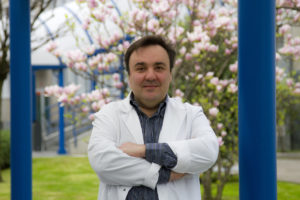Understanding and correcting glucose metabolism defects in A-T
Research Project information
Principal researcher: Associate Professor Vincenzo Costanzo
Institute: IFOM – The FIRC Institute of Molecular Oncology, Milan, Italy
Cost: £125.820,50 over 36 months in partnership with the A-T Society (UK), AEFAT (Spain) and BrAshA-T (Australia)
Start Date: 1st of April 2023
What are the researchers proposing to do?
Costanzo and team will test the hypothesis that ATM (the protein which is missing or not functioning completely in A-T) controls chemical reactions required for the correct use of glucose. Glucose usage defects could lead to glycogen accumulation*, which might be toxic for brain cells. They will study the molecular reactions controlled by ATM that promote the correct usage of glucose and assess possible toxicity of glycogen accumulation to understand how these defects occur and how they could be corrected. *Glycogen is the body’s stored form of glucose.
Why?
A-T is caused by the lack of functional ATM protein. ATM regulates the activation of chemical reactions that promote cell survival. The details of ATM function in the control of these reactions are poorly understood. Preliminary experiments indicate the presence of defects in glucose usage, leading to the discovery that A-T patients cells accumulate glycogen.
How will the research be done?
The team will study the mechanisms leading to inefficient glucose processing and glycogen accumulation in A-T cells and the impact of glycogen accumulation on A-T cell survival. They will monitor glucose metabolism in primary A-T cells and will directly measure the activity of enzymes controlling key regulatory reactions in glucose processing. They will also measure mitochondrial function to understand whether glucose usage defects are linked to mitochondrial impairments. In addition, they will explore the impact of known enzymes involved in glycogen accumulation and A-T cell survival to identify possible alterations in pathways controlling energy metabolism in A-T cells. Finally, the team will use Purkinje neurons derived from both healthy and A-T human reprogrammed cells in the lab to validate the impact of the alterations linked to impaired glucose metabolism.
How could it make a difference to the lives of those affected by A-T?
The researchers expect that these studies on isolated cells will provide fundamental clues on glucose metabolism impairment. The findings will be useful for clinicians looking to design therapeutic interventions with drugs, compounds and enzymes to prevent neuronal cell death during the early phase of A-T, and at later stages, to improve general well-being of A-T patients by improving A-T cells fitness.





